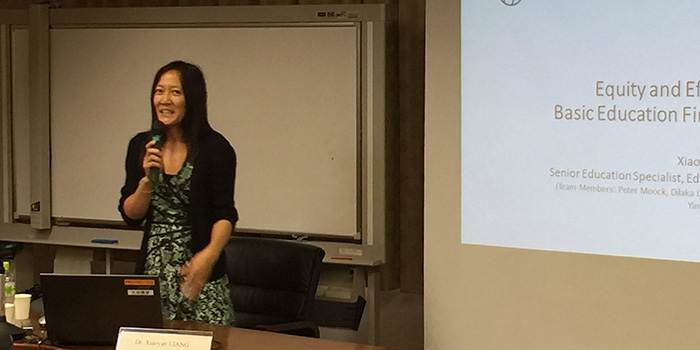Message from Dr. Aiko SAKURAI
After spending two years as Associate Professor at GSICS, Kobe University, I am now at International Research Institute of Disaster Science (IRIDeS), Tohoku University in Sendai, conducting researches on Disaster...
Graduate School of International Cooperation Studies (GSICS), Kobe University


Development management policy seminar was held on Tuesday 23rd June 2015, under the title “Issues and Challenges towards Competency-based Standards and National Qualifications Frameworks in the East Asia Region.” It was held in the main conference room of Kobe University’s Graduate School of International Cooperation Studies (GSICS) and chaired by Professor Keiichi Ogawa. Dr. Xiaoyan Liang, Senior Education Specialist at the World Bank was the guest speaker.
Before starting her presentation, Dr. Liang informed participants of the fact that she and Professor Ogawa have known each other for a very long time and that they both worked at the World Bank during the 1990s and 2000s. She went on to commence her presentation by asserting that Skills/TVET development is integral to the World Bank education strategy for the East Asia Region and that a study was being conducted with purpose of taking stock of the countries’ progress and challenges with regard to the development of national competency standards and the national qualifications framework.
According to Dr. Liang, the reasons for choosing the East Asia Region (EAP) as field study area include the fact that the region is home to 30% of the world’s population, living sometimes with restricted mobility and facing various issues such as, increasing urbanization, unstable employments, unequal productivity, different education opportunities, lack of qualifications standards, shortage of emerging skills and a strong demand for skills.
While explaining the concept of National Qualification Framework (NQF), Dr. Liang cited the example of Malaysia, a country that has established its Qualifications Framework since 2007 and, can be taken as an example of how to develop and implement a flexible Qualifications Framework and NQFs in the East Asia Region.
Dr. Liang covered other important issues regarding the achievements and persistent challenges to having good coordination of governance in the region for a quick and easy implementation of the study. She concluded her presentation with theoretical lessons learned and countries mission requirements towards the successful design and implementation of National Qualifications Frameworks.
The end of Dr. Liang’s very informative and stimulating lecture was followed by question and answer session. The questions mainly focused at gaining a deeper understanding National Qualifications Frameworks in the context of TVET and skills development, as well as in the context of developing and developed countries.
Authored by Bernard Yungu
Research Student
Related Link
http://www.kobe-u.ac.jp/en/NEWS/event/2015_06_23_01.html